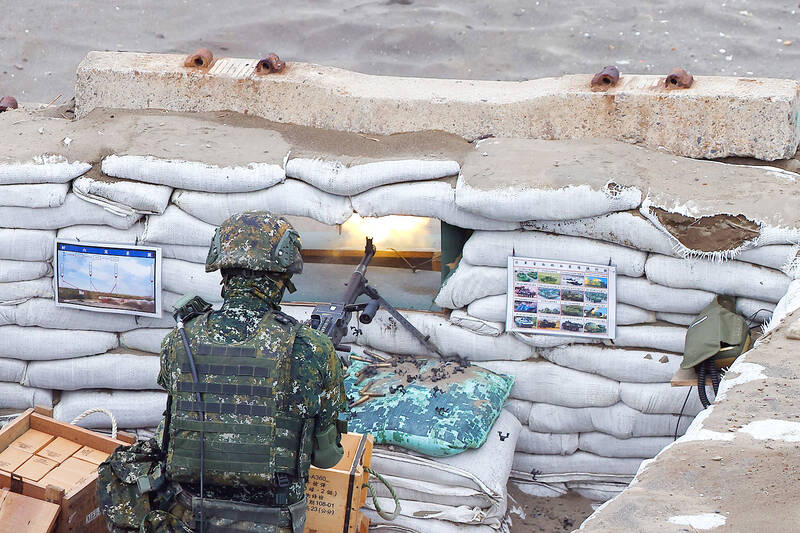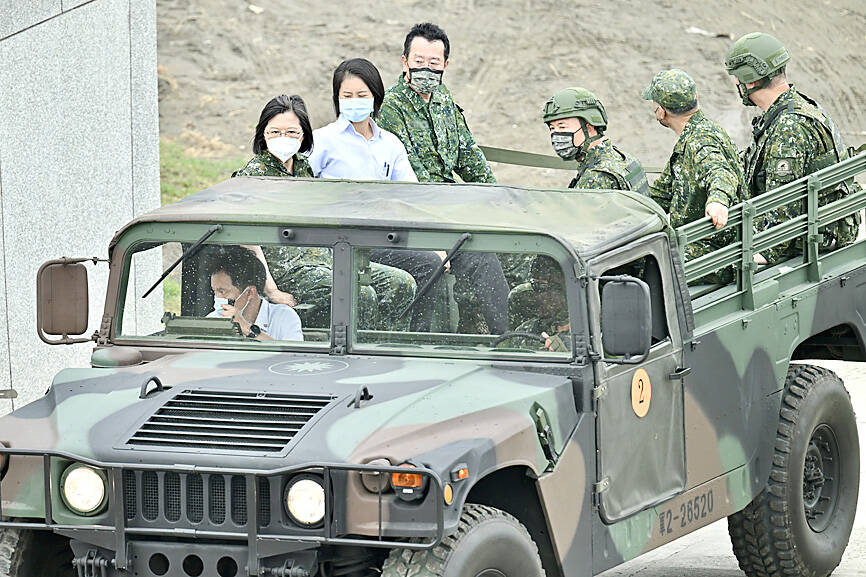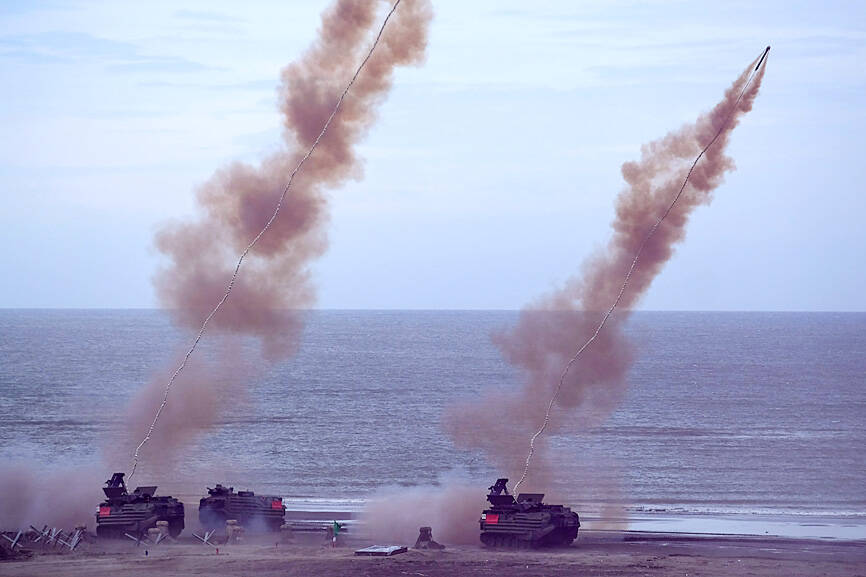The 39th annual Han Kuang military exercises reaffirm Taiwan’s resolute commitment to defending itself, President Tsai Ing-wen (蔡英文) said yesterday while observing the drills in New Taipei City’s Bali District (八里).
The fourth day of the live-fire phase of the exercises yesterday involved an anti-amphibious landing drill near the Port of Taipei in Bali, considered a critical site for repelling a Chinese attack.
Dressed in full military uniform and wearing a mask on her last Han Kuang inspection as president, Tsai boarded a Humvee, accompanied by Minister of National Defense Chiu Kuo-cheng (邱國正) and other senior military personnel, as they inspected the barricades and trenches on the beach, and temporary fortifications under Provincial Highway No. 61.

Photo: Ann Wang, Reuters
It was the second consecutive day that the president was inspecting the live-fire component of the annual drills, which started early on Monday and end today, despite testing positive for COVID-19 on Tuesday.
Tsai said she would never miss a Han Kuang exercise during her presidency, as it is of paramount importance to national security, adding that yesterday’s drills were the largest this year, which tested military cooperation with local police, firefighters and other organizations.
Taiwan’s defenses have taken pointers from the Ukraine-Russia war, utilizing local terrain to make its defensive positions more challenging to bombs or being fired upon, and bolstering overall defense capabilities on the coast, she said.

Photo: Tu Chien-jung, Taipei Times
While the drills demonstrated the nation’s ability to foil an attempt to secure a beachhead, the government cannot rest on its laurels and must continue to make plans that anticipate greater challenges in the future, she added.
In addition to bolstering the military’s overall defensive capabilities, the government should seek to integrate police, firefighters, local militias and other organizations into its defense plans to realize the goal of having the public take up arms in defense of the country, she said.
Tsai thanked the military on behalf of the public for its dedication to being the nation’s bulwark.

Photo: Sam Yeh, AFP
During a simulated beach invasion, troops from the Sixth Army Corps posed as “red” invading forces and “blue” defense ground troops, the Ministry of National Defense said.
The 30-minute drill began with the red invading troops making a forced landing on Bali beach in 20 AAV7 amphibious assault vehicles, the ministry said.
To repel the attack, the blue team deployed tanks and indigenous CM-32 Clouded Leopard armored vehicles, while also erecting barricades and digging trenches on the beach to slow the enemy’s advance.
Uncrewed aerial vehicles were also deployed to determine the enemy forces’ coordinates, which were then transmitted to a command center that mobilized ground forces in a counterstrike.
Meanwhile, a “blue” infantry soldier was seen armed with FGM-148 Javelin missiles in the trenches.
The portable anti-tank missiles have drawn wide attention because of their effective use by Ukraine to take out Russian tanks.
In the invasion simulation in Bali, defense troops also detonated explosives and smoke grenades to obscure the view of the invading forces and facilitate covert movements by the blue team, while the red team continued to advance on the beach under the cover of AH-64E and UH-60M attack helicopters.
As part of the Bali anti-amphibious landing drill, infantry troops stationed at a nearby temporary coastal fortification took up their designated positions in a 150m-long trench.
The fortification, which was set up under an elevated section of Provincial Highway No. 61, served as a second line of defense during the drill, allowing blue soldiers to eliminate members of the red invading forces who were advancing from the beach with tanks and artillery.
Some parts of the anti-landing drill were canceled due to strong winds from Typhoon Doksuri, including participation by the air force and navy, which were supposed to deploy fast mine-laying boats and the newly commissioned indigenous Yushan landing platform dock, a naval warship used to transport landing craft such as amphibious vehicles.
The ministry said that the Port of Taipei, Bali beach and Tamsui River (淡水河) estuary are strategic sites, comprising key defensive positions for fending off a potential seaborne invasion by the Chinese People’s Liberation Army.
Defending the area near the mouth of the Tamsui River has always been a priority for the military, because if it is breached by enemy forces, they could easily advance into the Greater Taipei area, the center of political and economic facilities, the ministry said.
Since they were first launched in 1984, the Han Kuang exercises have served as Taiwan’s major military drills, comprising live-fire exercises and computerized war games that are meant to test the nation’s combat readiness in the event of an invasion by China.
This year’s tabletop exercises were staged in May.

INVESTIGATION: The case is the latest instance of a DPP figure being implicated in an espionage network accused of allegedly leaking information to Chinese intelligence Democratic Progressive Party (DPP) member Ho Jen-chieh (何仁傑) was detained and held incommunicado yesterday on suspicion of spying for China during his tenure as assistant to then-minister of foreign affairs Joseph Wu (吳釗燮). The Taipei District Prosecutors’ Office said Ho was implicated during its investigation into alleged spying activities by former Presidential Office consultant Wu Shang-yu (吳尚雨). Prosecutors said there is reason to believe Ho breached the National Security Act (國家安全法) by leaking classified Ministry of Foreign Affairs information to Chinese intelligence. Following interrogation, prosecutors petitioned the Taipei District Court to detain Ho, citing concerns over potential collusion or tampering of evidence. The

NEGOTIATIONS: Taiwan has good relations with Washington and the outlook for the negotiations looks promising, Minister of Economic Affairs J.W. Kuo said Taiwan’s GDP growth this year is expected to decrease by 0.43 to 1.61 percentage points due to the effects of US tariffs, National Development Council (NDC) Minister Paul Liu (劉鏡清) said at a meeting of the legislature’s Economics Committee in Taipei yesterday, citing a preliminary estimate by a private research institution. Taiwan’s economy would be significantly affected by the 32 percent “reciprocal” tariffs slapped by the US, which took effect yesterday, Liu said, adding that GDP growth could fall below 3 percent and potentially even dip below 2 percent to 1.53 percent this year. The council has commissioned another institution

NEGOTIATIONS: The US response to the countermeasures and plans Taiwan presented has been positive, including boosting procurement and investment, the president said Taiwan is included in the first group for trade negotiations with the US, President William Lai (賴清德) said yesterday, as he seeks to shield Taiwanese exporters from a 32 percent tariff. In Washington, US Trade Representative Jamieson Greer said in an interview on Fox News on Thursday that he would speak to his Taiwanese and Israeli counterparts yesterday about tariffs after holding a long discussion with the Vietnamese earlier. US President Donald Trump on Wednesday postponed punishing levies on multiple trade partners, including Taiwan, for three months after trillions of US dollars were wiped off global markets. He has maintained a 10 percent

TRADE: The premier pledged safeguards on ‘Made in Taiwan’ labeling, anti-dumping measures and stricter export controls to strengthen its position in trade talks Products labeled “made in Taiwan” must be genuinely made in Taiwan, Premier Cho Jung-tai (卓榮泰) said yesterday, vowing to enforce strict safeguards against “origin laundering” and initiate anti-dumping investigations to prevent China dumping its products in Taiwan. Cho made the remarks in a discussion session with representatives from industries in Kaohsiung. In response to the US government’s recent announcement of “reciprocal” tariffs on its trading partners, President William Lai (賴清德) and Cho last week began a series of consultations with industry leaders nationwide to gather feedback and address concerns. Taiwanese and US officials held a videoconference on Friday evening to discuss the